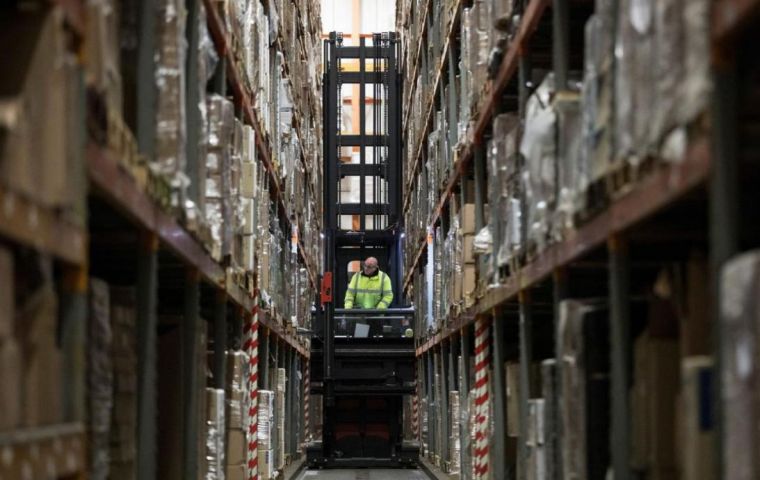MercoPress. South Atlantic News Agency
UK economy recorded last year the lowest growth since 2012, 1.4%
 No sector was spared the decline in the last month of the year but over the quarter, services were found to be the most resilient, registering a small bump.
No sector was spared the decline in the last month of the year but over the quarter, services were found to be the most resilient, registering a small bump. Britain's economy contracted in December, official figures revealed on Monday, suggesting that uncertainty over whether the country will leave the European Union with or without a deal is starting to hurt. Data from the UK's Office of Nation al Statistics, ONS, shows that gross domestic product (GDP) contracted by 0.4% in December.
As a result, GDP in the last quarter of the year reached just 0.2% — a sharp decline from the 0.6% registered in the previous quarter. Annual growth was recorded at 1.4%, the lowest level since 2012.
No sector was spared the decline in the last month of the year but over the quarter, services were found to be the most resilient, registering a small bump.
“GDP slowed in the last three months of the year with the manufacturing of cars and steel product seeing steep falls and construction also declining. However, services continued to grow with the health sector, management and IT doing quite well,” the ONS' head of GDP Rob Kent-Smith, said in a statement.
“The UK's trade deficit widened slightly in the last three months of the year, while business investment again declined, now for the fourth quarter in a row,” he added.
The chancellor of the exchequer sought to downplay the latest figures, arguing that the country's economy “remains fundamentally strong.”
”Growth of 1.4% in 2018 means the UK has grown every year for the past nine year, and the OBR (Office for Budget Responsibility) expects it to continue growing in every year of the forecast,“ he went on.
Meanwhile, International Trade Secretary Liam Fox rejected any suggestion that the slowdown was caused by the UK's imminent exit from the EU.
The country is scheduled to leave the bloc on March 29 and with just 50 days to go until the due date, uncertainty remains over whether the two parties will manage to clinch a deal.
”Clearly there are those who believe that Brexit is the only economic factor applying to the UK economy,“ Fox said. ”I think you'll find that the predicted slowdown in a number of European economies is not disconnected from the slowdown, for example, in China,“ he added.
”The further intensification of Brexit uncertainties, coupled with slowing global economy, has also weighed on our near-term outlook for UK growth,“ the Bank of England wrote following its December meeting. It added that ”uncertainties had intensified considerably“ over the previous months and that these were ”weighing on the UK financial markets.”
Business confidence in the UK has also been declining. The Institute of Chartered Institute in England and Wales (ICAEW) forecast earlier this month that it will drop to -16.3% in the first quarter of 2019, from -12.3% in the previous quarter.
“Companies at the moment are unclear about the future. Directors have the exceptionally difficult task of explaining within their annual reports the impact Brexit might have on their business models and operations,” Michael Izza, ICAEW's chief executive, said in a statement.




Top Comments
Disclaimer & comment rules-

Read all commentsThere is no basis for worry - remember those £ 350,000,000 a week, which will show themselves real soon now, eg. on April Fools Day.
Feb 13th, 2019 - 01:35 am 0Commenting for this story is now closed.
If you have a Facebook account, become a fan and comment on our Facebook Page!